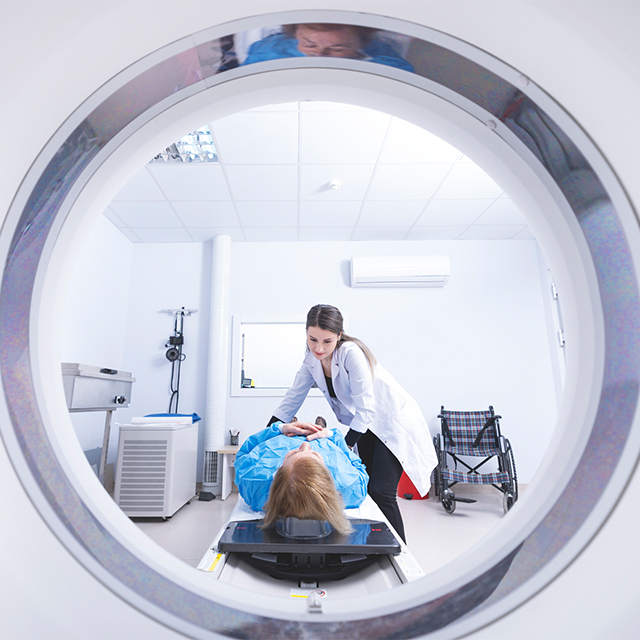This is a stressful time, but you’ll have support as you start to make decisions for the treatment of a brain tumor.
Learning you have a brain tumor can be scary. You may have a lot of questions and concerns, but you can rest assured knowing that your health care team is here to help.
“It’s normal to feel afraid,” said Dr. Patrick Kelly, a surgeon with Vanderbilt Neurosurgery. “Understanding brain tumor treatment options can help you feel less frightened. Your health care team at Vanderbilt will help you learn about your tumor and all of the treatment options available to you. Together, you can decide on what next steps make the most sense. Learning as much as possible about your tumor and your options also helps you work with your health care team to make the best choices about treatment.”
Working with your health care team
Your team may include any or all of these specialists:
- A neurologist, who specializes in treating problems with the brain or nerves.
- A neurosurgeon, who performs surgery on nerves or the brain.
- A medical oncologist, an expert in treating cancer with medicines (chemotherapy).
- A radiation oncologist, who specializes in treating cancer with radiation.
Your doctors and the other members of your health care team will answer any questions you have. They’ll help you through each of the steps you’ll take before, during and after any treatment. Your team will let you know what tests you need and the results of those tests. They’ll guide you in making treatment decisions and help prepare you and your loved ones for the road ahead.
While other types of cancer use stages to describe how advanced the cancer is and whether it has spread, brain tumors and brain cancers aren’t likely to spread elsewhere in the body, so they are graded rather than staged.
Understanding brain tumor grades
“A brain tumor’s grade is assigned when the tumor cells are tested in a lab. The grades range from 1 to 4 and are based on how the cells look under a microscope and the genetics of the tumor,” Kelly said. “A grade 1 brain tumor usually grows slowly. As the grade gets higher, the cells undergo changes so that they start to look very different. A grade 4 brain tumor tends to grow very fast and can require more intensive treatment.”
Learning about treatment options
To decide the best course of treatment for you, you will need to have tests done so your provider team has the information needed to recommend the correct course of treatment.
“Treatment for a brain tumor depends mostly on the type of tumor and the grade. Treatment options also depend on the size and location of the brain tumor,” Kelly said. “Options might include surgery, radiation therapy, radiosurgery, chemotherapy or other targeted drug therapies. When considering your treatment options, your health care team also considers your overall health and your preferences.”
What to consider when choosing brain tumor care
When considering where to get treatment — or where to get a second opinion — ask hospitals and surgeons how many doctors they have who are specifically trained in the specialties that deal with brain tumors.
Vanderbilt Health’s team includes neuro-oncologists, doctors who study and treat cancers affecting nerves and brain function.
“The Vanderbilt team includes surgeons who only perform operations within the skull and who’s clinical practice and research efforts are dedicated primarily to brain tumor surgery,” Kelly said. Other specialists also focus on neurological disorders and brain tumors, including a neurological intensive care unit (ICU), neurology rehabilitation, neuro-trained nurses, specialty pharmacists and others.
At Vanderbilt, the team works together to create a thorough, specific and personalized treatment plan for every patient. From the moment you schedule your appointment, the physicians and staff are available to help every step of the way. This team-based way of working is one of the reasons why Vanderbilt is a world-renowned brain tumor center.
“Vanderbilt University Medical Center is an academic medical center — this means doctors are also scientists who research brain tumors and how to treat them,” Kelly said. “The team is expanding clinical trial options. Vanderbilt has the only academic neuro-oncology (brain and nervous system cancer) program in an eight-state region, and the team strives to provide care to patients from all over the Southeast.”
Getting support
Coping with a tumor can be very stressful. Talk with your team about seeing a counselor for extra support. They can refer you to someone who can help you and your family. You can also visit support groups with other people coping with tumors. Ask your health care team about local brain tumor support groups.

Personalized care for brain tumors
With a brain tumor, the first step you take is important. Vanderbilt Health’s expert team works together to provide a precise diagnosis, second opinion consultations and the most effective treatment options, working with Vanderbilt experts across other specialties. For more information, call 615-421-8195.




